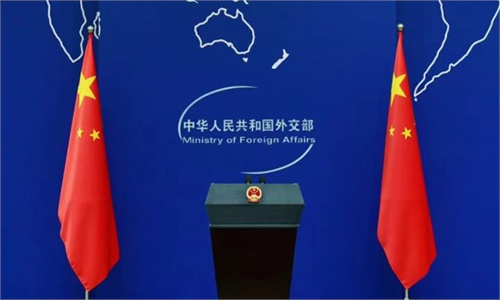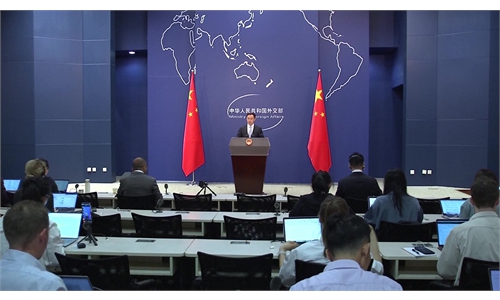
Illustration: GT
Editor's Note:
Chinese President Xi Jinping on Tuesday exchanged congratulations with European Council President Antonio Costa and European Commission President Ursula von der Leyen over the 50th anniversary of diplomatic ties between China and the European Union (EU).
Over the past half century, China-EU relations have weathered storms and deepened cooperation and have become an important interactive link between the world's two major forces, two big markets and two great civilizations. How can the development of China-EU relations over the past 50 years be summarized? What lies ahead for the bilateral relationship? What are the pressing issues that need to be addressed in China-EU relations? The Global Times invites three Chinese and European scholars to discuss what story China-EU relations will write in the next chapter for the next 50 years, and further.
Gao Jian, director of the Center for British Studies at Shanghai International Studies University and China Forum expert of the Center for International Security and Strategy at Tsinghua University
China-EU relations are one of the most important bilateral relations in today's world. It has far-reaching practical significance and cultural value for both China and Europe. There is no fundamental contradiction in geopolitical security between China and Europe, and they share a high degree of consensus on a series of major strategic issues related to human development.
China and Europe are important political forces in safeguarding international multilateralism. China and Europe are committed to safeguarding the international cooperation mechanism of multilateralism formed after World War II, jointly promoting the direction of multipolarization in the world, safeguarding the core position of the United Nations in handling international affairs, advocating the multilateral cooperation mechanism based on international law, and providing extensive space for cooperation in jointly addressing global issues such as climate change.
China and Europe are important economies in safeguarding the global free trade system. China and Europe agree on the central position of the World Trade Organization in promoting economic globalization and trade liberalization and share a common position in opposing economic bullying and trade protectionism.
Chinese and European cultures have made significant contributions to the development of human civilization. Chinese civilization is an important component of human culture, while European civilization is an important component of modern human civilization. Historically, the exchanges between Chinese and European civilizations have made significant contributions to the development of human civilization. Furthermore, in the 21st century, they will also provide a strong spiritual and ideological impetus for the realization of the common values of mankind.
To maintain the healthy development of China-EU bilateral relations, we must first solve the problem of cognition. China and the EU should lead the overall development of China-EU bilateral relations with a future-oriented strategic vision, and properly resolve conflicts and differences through dialogue and exchanges on the basis of mutual respect for each other's core interests. On the basis of China-EU economic and trade cooperation, a three-dimensional, diversified and stable China-EU bilateral relationship should be constructed, so as to give the China-EU comprehensive strategic partnership a constant impetus for development.
Sebastian Contin Trillo-Figueroa, a geopolitics analyst from Spain with a specialization in EU-Asia relations
Seen from afar, the bond between China and the EU can appear tense, even distrustful. But seen through the lens of time, the picture is far more balanced - and far more hopeful. For 50 years, China and the EU have grown together, not always in harmony, but in tandem, closer than appearances allow.
Fifty years ago, Europe was still struggling with the Cold War, and China was taking its first steps toward a new era. Few could have foreseen their economic closeness today. By 1985, they signed an agreement on trade and economic cooperation; by 2003, they were strategic partners. Trade expanded rapidly. What began with caution became a relationship shaped by mutual interest and growing interdependence.
Today, China and the EU are among each other's largest trading partners. The mutual benefit is undeniable - where there was once distance, there is now dense interconnection. And yet, alongside these gains, a sense of unfamiliarity remains. Misunderstandings - about political systems, social priorities or global roles - sometimes eclipse the deeper currents of cooperation that still flow beneath the geopolitical surface.
The past decade tested the relationship. China, more comfortable with bilateral relations, has found the EU's supranational nature hard to decode. In 2019, the EU labeled China a partner, a competitor, and a systemic rival, reflecting growing complexity. The 2021 shelving of the long-negotiated Comprehensive Agreement on Investment, followed by mutual sanctions, revealed a misalignment beneath decades of cooperation.
Yet even here, the glass is half full. The real task is not how to agree on everything, but managing differences without eroding trust. The EU turned a war-torn continent into a space of peace and integration; China underwent one of the most remarkable transformations of any society in modern history. Neither path was smooth, but both reflect resilience and a shared capacity for long-term vision.
That spirit is what's needed now. Cooperation does not need uniformity. What matters is the willingness to keep building - dialogue, market openness, joint ventures - in good faith, with respect for each side's political and historical complexity.
This has never been an easy relationship, but it has always mattered. Built through uneven steps, shaped by both misunderstanding and progress, it endures not out of habit, but from mutual recognition. The task is not to begin again, but to continue - more discerning, more transparent and keener to accept that between difference and partnership lies the space for balanced exchange, lasting benefit and contribution to global stability.
Pierre Picquart, an expert in geopolitics and human geography from the University of Paris-VIII
Fifty years of China-EU dialogue - sometimes hesitant, often strategic, always meaningful. Over the decades, China and the EU have built a dense relationship based on economic partnerships, cultural exchanges and political dialogue-but also marked by misunderstandings, rivalries and deep divergences.
In the 1980s, China-EU relations intensified following China's economic opening. European companies saw a vast emerging market, while Beijing found a valuable technological and financial partner. These ties deepened in the 2000s with China's accession to the WTO, making the EU its largest trading partner. However, as China asserted its global ambitions, notably through the Belt and Road Initiative, Europe oscillated between cooperation and cautious distrust.
Today, this relationship is under strain. The global geopolitical context complicates cooperation. The EU is increasingly concerned about its dependence on China in strategic sectors such as rare earths, green technologies and medical supplies. Meanwhile, Beijing views Europe's growing alignment with the US and "de-risking" strategies as potential threats. Nevertheless, these challenges coexist with real opportunities. China and the EU share key interests in global stability, climate action, sustainable development and international governance reform. With renewed will, their cooperation could provide a strategic counterbalance in a polarized world. This, however, requires honest dialogue, mutual respect for cultural and institutional differences, and a clear acknowledgment of each side's core interests.
France occupies a special place in this dynamic. In 1964, it became the first major Western power to establish diplomatic ties with the People's Republic of China. This historic link has grown into strategic partnerships, shared cultural projects and a diplomacy that often seeks balance and independence. France could act as a bridge between Europe and China, promoting an open and autonomous European voice. On this 50th anniversary, we should avoid triumphalism and disillusion. This moment calls for a clear-sighted assessment of past efforts, an understanding of today's challenges and a bold vision for a shared future. Through genuine engagement, China and the EU can still build a fertile relationship - not based on alignment, but on active convergence of interests.



